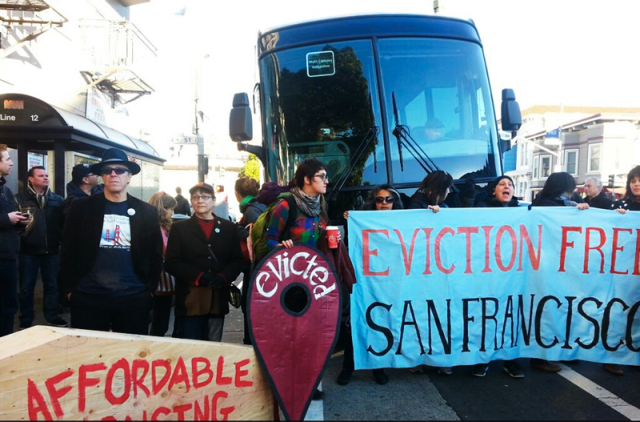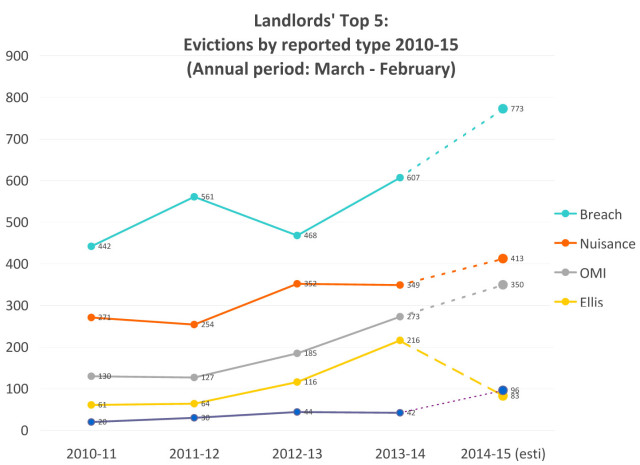
By Gen Fujioka
JANUARY 6, 2014 – Ellis Act evictions are often the most dramatic and destructive forms of evictions because they displace all the tenants in a building. As we discussed yesterday, Ellis Act evictions surged in 2012-2013 and then declined last year in the face of tenant resistance and aggressive policy proposals to control speculation. But other forms of evictions are also displacing tenants and accelerating gentrification in vulnerable communities.
To evaluate the threat of eviction, we turn again to data from the Rent Board. San Francisco requires landlords to file with the board most eviction notices involving rent controlled units. Notices for failure to pay rent are not reported.
Based on these filings, the board publishes in the spring an annual report on the number evictions by category for the 12-month period ending each February. We can project trends based upon the monthly data available for the first eight months through October 2014.
Based on these projections, Rent Board data yields the following for the top five grounds for evictions in the city (again, excluding failure to pay or late payment of rent) tracking the trends over the past five years:
Notes: “Breach” refers to allegations of breach of a provision of a rental agreement or lease and “OMI” refers to claimed owner-move-in evictions. “Ellis” refers to Ellis eviction notices issued – the second step in the Ellis eviction process (the units withdrawn data from yesterday’s story is a more inclusive and larger number). The current period is estimated by extending the rate over the first eight month through February 2015.
Combined across all categories, the total number of 2014 evictions is trending higher than 2013 — even with the decline in Ellis evictions. According to housing counseling organizations, with record market-rate rents landlords are looking for any justification to evict tenants.
The Eviction Defense Collaborative’s Deepa Varma reports, “we see more and more breach cases every day.” She said that many of these cases involve claims that tenants are violating leases that prohibit subletting where in fact the alleged “subtenants” are members of the same family.
The rent ordinance establishes a procedure for adding such household members to the lease but many families are not aware of their rights and end up moving out. According to Varma, these evictions could have been prevented with earlier counseling and assistance.
My colleague Tina Cheung at Chinatown Community Development Center counsels tenants every day. She also sees an expansion of other eviction attempts and notes that landlords often take advantage of language and other barriers to evict immigrant families and seniors: “Agreements and notices written only in English are not fully understood yet become the basis for ‘breach’ evictions. Some evictions are attempted without any legitimate basis just to scare tenants into moving.”
Fred Sherburn-Zimmer of the Housing Rights Committee sees a similar increase in eviction notices for technical lease violations or outright false claims. She told me that “landlords are making up plans to move into tiny apartments when they clearly have no intent of giving up their existing homes.They are claiming lease violations that have no basis in fact.”
Stopping the rise in evictions is essential for keeping what remains of San Francisco affordable housing and social diversity say tenant representatives.
“A majority of city’s tenants cannot afford today’s market rents and unless they can keep their existing apartments most will be forced to leave the city,” said Steve Collier, senior counsel at the Tenderloin Housing Clinic. “Landlords are looking for legal loopholes and excuses to evict and raise rents. The city can and should do more to close those loopholes and control evictions.”
Collier and other tenant advocates are evaluating proposals to address these concerns. Some of the concepts being discussed include:
- Allow tenants to change roommates or household members without risk of eviction.
- Take the profit motive out of evictions by controlling rent increases on units after a no-fault eviction.
- Step up enforcement of controls on illegal conversions rent controlled units (e.g., short term rentals and SROs) and wrongful evictions.
Advocates also note the need to keep Ellis eviction reforms on the agenda. The activism that slowed Ellis evictions in 2014 will need to be sustained until there is reform in Sacramento or local controls on the real estate speculation that fuels those evictions.
Winning these reforms will not be easy. But in the view of Bobby Coleman, who works with the SF Tenants Union, rising evictions and rents have the potential to unite long-time residents and newcomers to in a common cause. “Most tech workers are also tenants,” Coleman said. “They also are doubling up to pay the rent.” He believes that building an agenda that unites the city’s tenant majority, including tech workers, offers new opportunities for change.
Polls show that the housing crisis remains a top concern of a majority of the city’s voters. In 2014, that sentiment provided the basis for tenants to build broad popular opposition to Ellis Act evictions. To address the changing eviction challenges of 2015, tenants will need to expand awareness and popular concern not only for Ellis evictions, but other threats as well.
Gen Fujioka is Policy Director for Chinatown Community Development Center and is a boardmember of 48 Hills. The opinions expressed this in this article are his own and not necessarily that of CCDC or 48 Hills.






